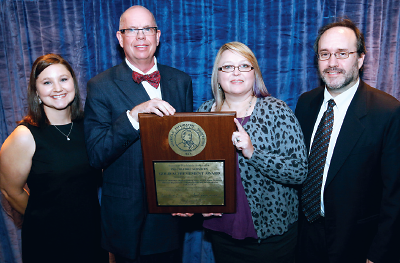Four programs providing unique and innovative services for people with mental illness were honored last month during the Opening Session of APA’s IPS: The Mental Health Services Conference in New York. Each year, APA awards two Gold Awards (one for an institutionally based program and one for a community-based program), a Silver Award, and a Bronze Award.
•
Gold Award for Institutionally Based Program: Sexual Behaviours Clinic, Integrated Forensic Program, Royal Ottawa Mental Health Centre, Ottawa, Ontario .
The Sexual Behaviours Clinic (SBC), first established in 1983, seeks to protect communities by preventing sex crimes and improve patient well-being so that sex offenders can go on to lead successful and productive lives in the community.
Through partnerships with community agencies that monitor and support sex offenders in the community, such as the Ottawa Police, the Circles of Support and Accountability, the Children’s Aid Society, and Probation and Parole, the clinic treats about 175 new patients each year, mostly with a combination of medication and individual and group-based psychotherapy.
Treatment in the SBC can include a combination of medications, group therapy, couples therapy, and individual therapy. Pharmacologic treatment offered by the clinic helps to reduce sexual impulses that might normally preoccupy the patient, including selective serotonin reuptake inhibitors, which are particularly effective at controlling abnormal sexual impulses, and antiadrenergic medications, which reduce—and, in some cases, completely suppress—sex drive. The use of these medications is completely voluntary, as is all treatment offered by the SBC.
•
Gold Award for Community-Based Program: Missouri Community Mental Health Center Health Home Program, Jefferson City, Mo.
The premature mortality associated with serious mental illness is largely preventable. There is strong evidence that access to high-quality, integrated care can improve the health of individuals with serious mental illness.
In 2011, the state of Missouri made a commitment to its citizens to focus on prevention efforts. Using an integrated care approach, Missouri’s Department of Mental Health (DMH) collaborated with the state’s Medicaid system (MO HealthNet) and community mental health system to establish “health homes” throughout the state’s 29 community mental health centers. All adults enrolled in Missouri’s Community Mental Health Center (CMHC) Health Home Program have a serious mental illness, and all children and youth in the program have a serious emotional disorder.
The health home approach allows eligible Medicaid enrollees to receive health care for targeted chronic conditions such as diabetes, chronic obstructive pulmonary disease, hypertension, and asthma, as well as mental health care. Health homes either strengthen linkages to community primary care providers (PCPs) or bring PCPs in house.
Missouri’s investment in integrated care has resulted in improved care coordination and has placed Missouri on a national stage as a model in integration.
•
Silver Award: Student Outreach and Teacher Training to Ensure Prevention, Early Recognition, and Treatment of Mental Health Problems, Mental Health Association of East Tennessee, Knoxville.
For the past 15 years, the Mental Health Association of East Tennessee (MHAET) has been working in schools to promote the mental and emotional well-being of students. MHAET has implemented a two-pronged integrated approach to reach both students and teachers: Mental Health 101 for middle and high school students and in-service training for teachers, including Typical or Troubled?, a program of the American Psychiatric Association Foundation. In the 2014–2015 school year, these programs had a direct impact on 23,928 students in 83 middle and high schools in the MHAET catchment area, which includes the urban areas of Chattanooga, Knoxville, Johnson City/Kingsport, and surrounding rural areas—a population of 2.5 million residents in 35 counties.
Mental Health 101 was associated with several positive outcomes during the 2014–2015 school year: an increase of 325 percent in the number of high school students who could identify a sign of mental illness, a 191 percent increase in the number of high school students who could identify a warning sign of suicide, a 175 percent increase in the number of middle school students who could identify a warning sign of suicide, and a 50 percent increase in the number of middle school students who could identify the correct duration of symptoms before seeking help.
•
Bronze Award: SUSTAIN (Supporting Seniors receiving Treatment And Intervention), a program of the Department of Psychiatry at the University of Pennsylvania’s Perelman School of Medicine, and the Pennsylvania Department of Aging (DoA).
This program is recognized for its private-public partnership to deliver population-level integrated care to low-income seniors in Pennsylvania.
SUSTAIN has two broad goals: to identify community-dwelling elders at risk of poor health outcomes, including nursing home admission, and to support those patients and their primary care prescribers to manage their mental health care, consistent with evidence-based guidelines, across the state.
The innovation embodied in SUSTAIN is a merger of two existing powerful tools—a large pharmacy benefits database maintained by the DoA and a software-supported collaborative care program developed by the University of Pennsylvania.
The DoA database provides real-time information about new prescriptions for psychotropic and anti-dementia medications for low-income Pennsylvania residents aged 65 and older. In this population, more than 90 percent of prescriptions for psychotropic medications are written by primary care physicians.
SUSTAIN staff uses the DoA database to identify geriatric patients with newly diagnosed behavioral health problems and their primary care providers across the state. These patients are then contacted by the SUSTAIN staff, who provide telephone-based clinical assessments and deliver a variety of behavioral health services, including therapy support, education, and support services for caregivers. ■




